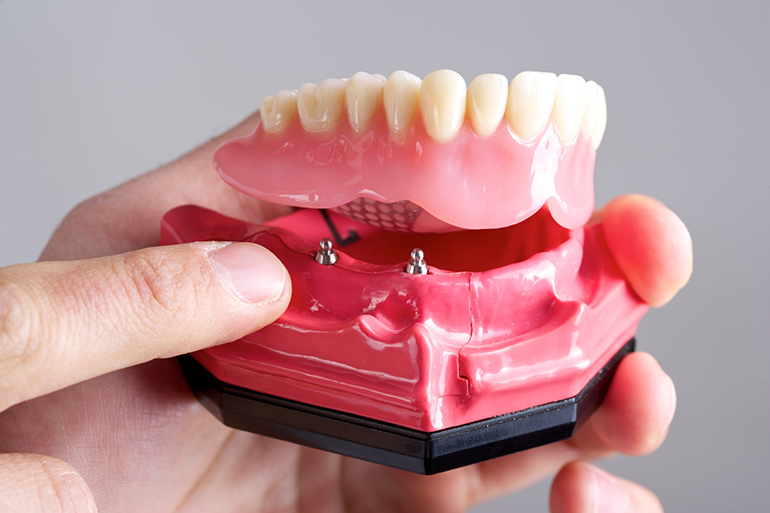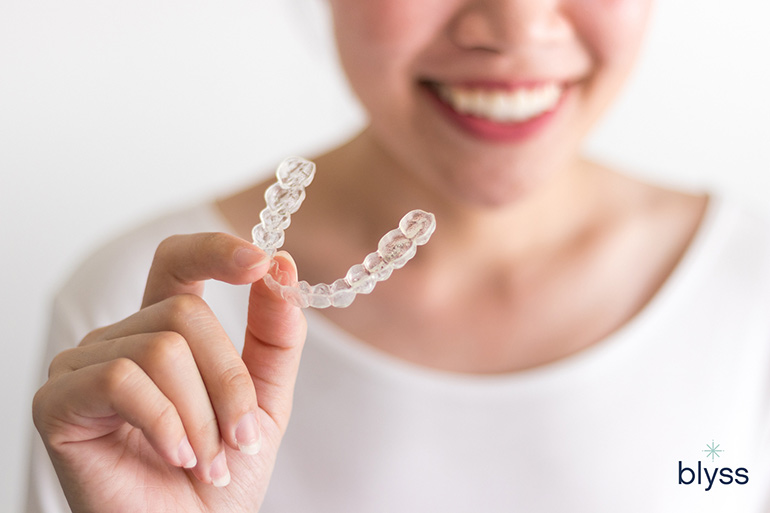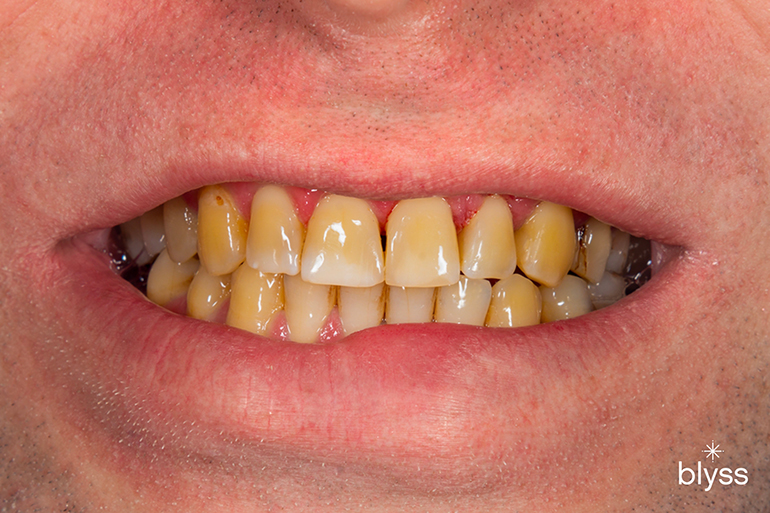Permanent dentures are a great solution if you’re looking for something that won’t slip when you’re talking, eating, and laughing. After all, there’s nothing worse than worrying about your teeth staying in place, especially when you’re out in public.
Unlike traditional dentures, permanent dentures are held in place by dental implants.
The dental implants placed into your jaw bone serve as a stable base, offering stability to your dentures. You can chew, talk, and smile more confidently and comfortably than with removable dentures.
How are they different from traditional dentures?
Imagine this. You’re out grabbing a bite to eat with your friends, and you can eat and socialize without having to worry about your dentures slipping around or falling out. This is exactly what you get with permanent dentures.
Studies show that about 40% of patients stop using their removable partial dentures (RPD) within 5 years due to pain, cosmetic concerns, and other social factors.
This is why many patients are drawn to the idea of never having to take their dentures out.

Over time, traditional dentures can become loose and may require relining or rebasing to fit correctly and comfortably.
Table 1. Permanent Dentures vs. Traditional Removable Dentures
| Permanent Dentures | Traditional Dentures | |
|---|---|---|
| Cost | Between $14,000 to $32,000 per arch depending on the type of permanent dentures | Low-cost dentures — $300 to $500 per denture or $600 to $1,000 for a complete set Mid-priced dentures — $500 to $1,500 per denture or $1,000 to $3,000 for a set Premium dentures — $2,000 to $4,000 per denture or $4,000 to $8,000 for a set |
| Stability and Fit | Tightly secured to gums by implants, more stable fit | Less stable fit, may require adhesives to stay in place |
| Appearance | More natural looking | Less natural looking |
| Cleaning | Daily brushing and flossing (depending on the type of permanent dentures), regular professional cleaning (every 6 months) | Must be removed from the mouth each night for cleaning |
| Comfort Level | Fit snugly against your gum line, creating a secure and comfortable fit all day long | Can be uncomfortable due to pressure points caused by ill-fitting bases |
| Maintenance | Require healthy gums and jawbone structure to support them | You may need to add relining material to the inside of the dentures over time due to changes in your gum tissue |
Types of Permanent Dentures
There are two types of permanent dentures available in San Diego, California. Depending on your preferences, one may seem more appealing to you than the other.
- Snap-on Dentures (Overdentures): Also called implant-supported dentures, snap-on dentures are held in place by dental implants. The dentures are “snapped” onto the implant posts. The dentures are removable, but the implant posts are not. You can snap off the prosthesis to clean them easily.
- Full-arch Permanent Dentures: Full-arch permanent dentures are held in place by several dental implants that are placed in the jaw. This type of denture provides a stronger and more secure fit than snap-on dentures.You can’t remove the prosthesis yourself. Only your dentist can remove your prosthesis during your regular dental cleaning and checkup visits.An all-on-4/5/6/8 dental implant is a type of full-arch permanent denture. This denture is held in place by multiple implants that replace all the missing teeth in an arch (upper or lower).
Who is a good candidate for permanent dentures?
The most ideal candidate for permanent dentures will be someone who has lost all of their teeth in either the upper or lower arch due to an accident, gum disease, cavities, or other dental issues.
Although permanent dentures are great for many people, they may not be the best choice for everyone.
The candidate must have healthy gums, good oral hygiene habits, and enough bone structure in their jaw to support the implants.
In addition, the candidate must be healthy, without diabetes or certain other medical conditions that may prevent the placement of implants.
Benefits and Risks Associated with Permanent Dentures
There are many advantages to permanent dentures, as well as some potential drawbacks.
Benefits of Permanent Dentures:
- Offer a permanent solution to missing teeth
- Preserves your facial structure by preventing your jawbone from deteriorating
- Look and feel like natural teeth
- More comfortable for chewing, smiling, and speaking
- Provide a more stable and secure fit than traditional dentures
- Speak in public confidently without worrying about your dentures falling
Drawbacks Associated with Permanent Dentures:
- Can be more expensive than other options
- Fixed permanent dentures are more difficult to clean than removable dentures
- Require surgery, which carries its own set of risks, such as infection or inflammation
- Not everyone is a candidate for permanent dentures
Getting Permanent Dentures: The Process
The journey from consultation to the final fitting and adjustment period can take several weeks or months, depending on the complexity of your case. It is more time-consuming than getting traditional removable dentures.
If you lack sufficient jawbone, you may require additional procedures such as bone grafting.
Here’s a step-by-step process of getting permanent dentures, from consultation to final fitting.
Stage 1: Consultation
The first step is a consultation with your dentist to discuss your medical and dental history. Your dentist will take a panoramic x-ray, a 3D Cone Beam x-ray, and/or intraoral photographs to assess the condition of your teeth, gums, and jawbone. This is to determine whether or not you are a suitable candidate for this type of treatment.
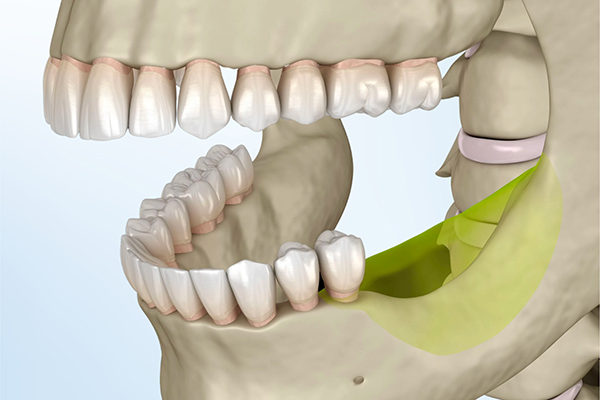
Without a solid foundation to support permanent dentures, they can slip and cause pain or even further damage adjacent teeth
Stage 2: Preparation
If it is determined that you are a candidate for permanent dentures, your dentist will extract decayed or damaged teeth. He or she will also need to perform bone grafting to increase the stability of your jawbone prior to implantation.
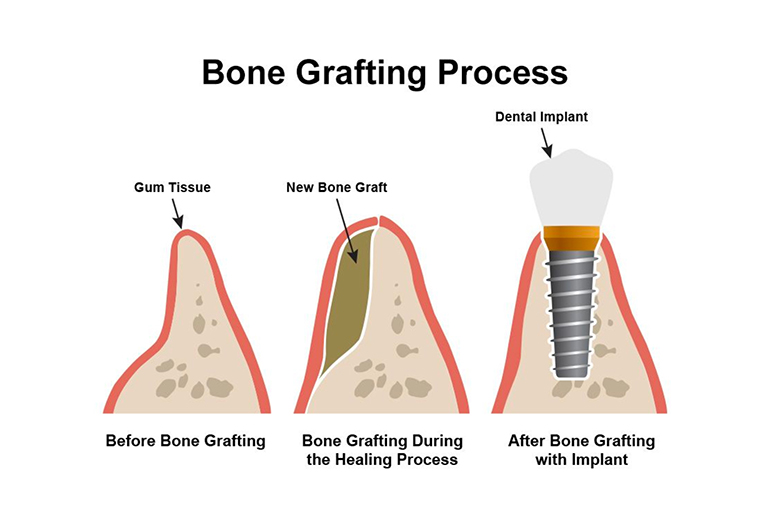
Bone grafts provide the essential stability and support needed for the natural function of permanent dentures, as well as provide the patient with a more comfortable fit of the final permanent teeth.
Stage 3: Implant Placement
Once the extraction sites have healed, your dentist will surgically insert dental implants into your jawbone, where they will act as anchors for the dentures.
Your dentist may perform the extractions, bone grafting, and dental implants in one surgery. Permanent denture procedures, such as All-on-4 dental implants or immediate-load implants, follow this technique.
Stage 4: Healing & Integration
After implant placement surgery, recovery and healing will typically take between 3-6 months. During this period, osseointegration takes place by which the implant fuses to the jawbone.
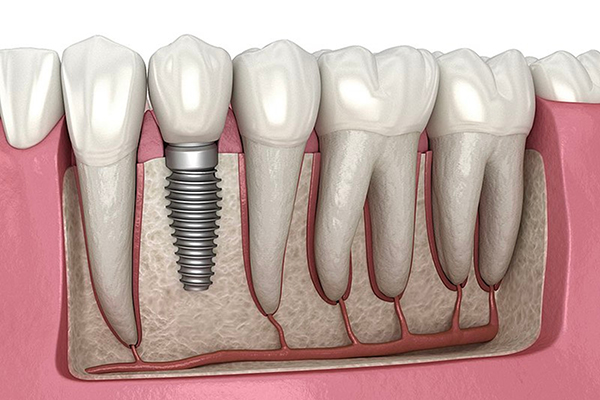
Through osseointegration, the implant becomes part of the body and provides a secure base for artificial teeth. The bone around the implant fuses with it over several months, creating an incredibly strong bond that easily withstands the force generated by chewing and speaking.
Stage 5: Final Fitting & Adjustment Period
Once healed, it’s time for the final fitting and adjustments. Your dentist will take impressions for your denture. Once your custom denture is fabricated, it will be permanently screwed onto the implants to give you a beautiful new smile.
Cost of Permanent Dentures in San Diego
The cost of permanent dentures in San Diego can vary depending on a number of factors, including the type and number of implants being used, as well as the complexity of your case.
It ranges from $14,000 to $30,000 per jaw, depending on the type.
However, this does not include any pre- or post-op care and maintenance that may be needed, which can add an additional cost of several hundred dollars.
Many dentists will offer free consultations, which can be a good opportunity to ask questions and get a better sense of what to expect. At Blyss Dental, we offer just that. Book a free consultation with us to start your journey to a better smile.
Some dental insurance plans will help cover the cost, so be sure to check with your insurance provider.
Blyss Dental Tip: Looking for ways to pay for your permanent dentures? Consider getting dental implant financing to reduce the cost to a more manageable monthly payment.
Final Takeaways
If you’re considering getting permanent dentures, it’s important to do your research and prepare for a lengthy process that may involve several stages and additional costs.
Your dentist will provide guidance throughout the process. Still, it is also important to be proactive in your own care by following all post-op instructions and being mindful of any changes in your overall or dental health.
Ultimately, its benefits can be well worth it if they are a good fit for you and your lifestyle. So do your research, consult your dentist, and take the necessary steps to get fitted for permanent dentures today.
At Blyss Dental, we understand that getting permanent dentures is a big decision—one that comes with a lot of questions. That’s why we offer free consultations to help patients learn more about their options and make an informed decision about whether or not permanent dentures are right for them.
Book a free consultation at Blyss Dental today.
Frequently Asked Questions (FAQs)
- Is the procedure of getting permanent dentures painful?
The procedure for getting permanent dentures is typically not very painful. However, you may experience some mild discomfort or feel a little sore for a few days after the procedure. - What happens if my dentures break?
If your dentures break for any reason, you must contact your dentist immediately. Your dentist will be able to determine what needs to be done to repair or replace them, depending on the situation. In some cases, you may need a new set of dentures. - How long do permanent dentures last?
There is no definitive answer to this question, as the longevity of permanent dentures can vary depending on a number of factors, such as your overall health, maintenance habits, and lifestyle. Most can last anywhere from 7 to 15 years or more with proper care. The dental implants themselves can easily last 20 years or more with optimal physical and oral health. - How to properly take care of permanent dentures?
It is important to practice good oral hygiene and regularly attend follow-up appointments with your dentist. You can easily snap off overdentures to clean them. Then you snap them back on to the implants. Fixed permanent dentures require special floss and a waterpik to clean between your gums and fixed prosthesis.
Sources Cited From
- Nesbit, S. P., Reside, J., Moretti, A., Gerdts, G., Boushell, L. W., & Barrero, C. (2017). Definitive phase of treatment. Diagnosis and Treatment Planning in Dentistry (Third Edition), 226-258.e10. https://doi.org/10.1016/B978-0-323-28730-2.00019-4
- American Dental Association. (n.d.). Dentures. https://www.ada.org/. https://www.mouthhealthy.org/all-topics-a-z/dentures
- Campbell SD, Cooper L, Craddock H, Hyde TP, Nattress B, Pavitt SH, Seymour DW. Removable partial dentures: The clinical need for innovation. J Prosthet Dent. 2017 Sep;118(3):273-280. doi: 10.1016/j.prosdent.2017.01.008. Epub 2017 Mar 23. PMID: 28343666.
